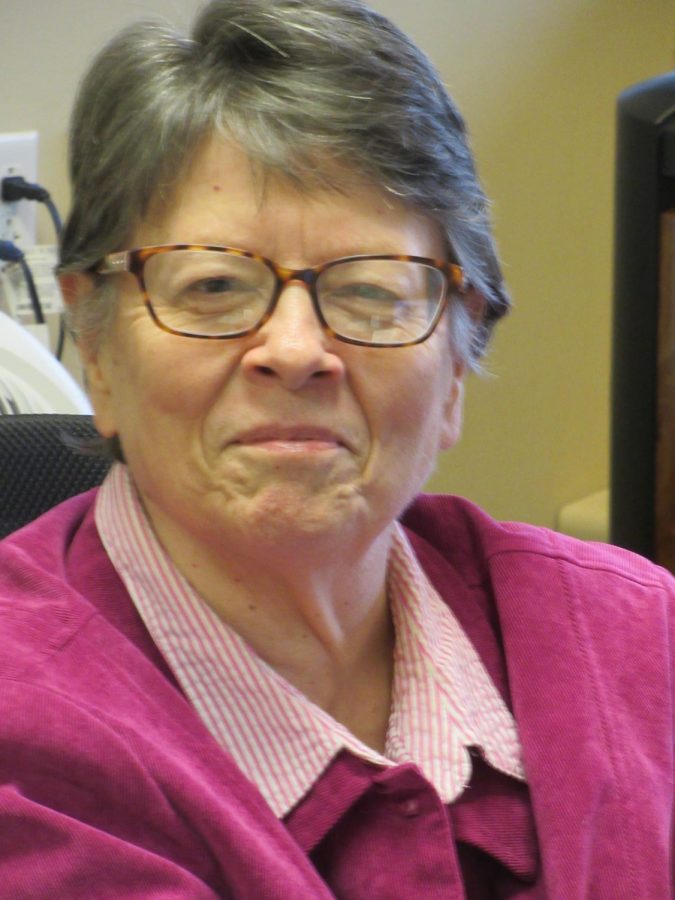TRiO seeks eligible students
Karen Madden
Academic Support Services provides many services to students, including advising, personal counseling, mentoring, individual and group academic coaching, career development, and services for students with disabilities.
Housed within this office is NVU-Johnson’s longstanding federal grant-funded TRiO program, which provides support for students who are first-generation in their family to attend college or come from socioeconomically disadvantaged populations. Additionally, NVU-Johnson students can qualify for TRiO if they have a diagnosed disability.
Academic Support Services is funded 65% by the U.S Department of Education’s TRiO grant, which gives the NVU-Johnson campus $415.421 for Academic Support Services each year.
“TRiO is a program that is grant funded, so every five years each program — Student Support Services is one, Upward Bound is another, there’s a whole bunch of different kinds — but each one is a five-year grant, and so each program has to reapply every five years,” Director of Academic Support Services Dr. Karen Madden said. “It’s a pretty stiff competition. They fund less than 50% of the people who apply in general. It’s based, like most grant competitions, on a numerical scale.”
Madden noted that TRiO grants have specific objectives. “For student support services [the objectives are] a percentage of students who are in good academic standing, a percentage of students who persist from year to year, and a percentage of students who graduate. Those are the three objectives. They don’t change,” she said.
The number of students eligible for TRiO also impacts the likelihood of getting the grant again. Shane Stacey, who is the math and science specialist in Academic Support Services, estimates that currently about 170 of Johnson campus students are registered with TRiO, which is shy of the university’s target number of 235 students.
Declining enrollment over the past few years has made reaching that target more difficult. “The fewer students that NVU has, the harder it is for us to get 235,” Madden said. “We knew in 2019 because that’s when we actually wrote the grant, that about 70% of the students at that point were eligible for TRiO.”
Regardless of total enrollment, 235 is the number of students needed. Meeting that target gives NVU-Johnson bonus points in the grant application, which could ensure that the campus gets the grant next cycle.
Despite the current gap, Stacey says he isn’t concerned about being able to meet the target number of TRiO students. “It’s not unusual in the fall semester to have that hole, because we have all of these graduates and then we’re starting to make contacts with the incoming freshmen and bringing them into the grant, and it’s an ebb and flow,” Stacey said, acknowledging that “we have to do a better job connecting to every person on this campus.”
Although NVU-Johnson’s TRiO programs have been funded since 1971, there’s no guarantee that continued funding is assured. “Everybody in this office, their job depends on it and the 235 students that we see here depend on it, so we do our very best. We’ve been fighting since 1971, Madden said. “The grant is really competitive every time.”
The federal grant has played an important role in funding the work of Academic Support Services. According to Madden, the grant is responsible for paying 90% of her salary, as well as more than 50% of numerous other employees.
While NVU-Johnson currently has a TRiO grant, the Lyndon campus hasn’t been so lucky. “Lyndon had a grant, which they lost in the [2015] grant cycle, so they haven’t had one since 2015,” Stacey said. “They currently do not have a grant, and they obviously have academic support, but it’s funded fully by NVU. They don’t have that grant money that’s helping with that process [here].”
Madden emphasized that disability services and student support would certainly not disappear without the grant, but as is now the case on the Lyndon campus, funds would have to come from elsewhere.
TRiO supports not only eligible students, but other students as well. “We serve any student who walks in our door. We’re a one stop shop,” Madden said. “If we can’t help them, we will find somebody on campus [who can]. We never turn anybody away…In a given semester before COVID, we would have roughly 1000 appointments. That would be tutoring, disability services, meeting your mentor, any of the services that we provide.”
Stacey encourages students who need support to stop into the Dewey regardless of their TRiO-eligibility status.
“We’re in Dewey right next to the water fountain. We always have snacks, or almost always have snacks,” Stacey said. “One of us will be happy to talk with you. Right by our doorway you’ll see a QR code where you can just scan your smartphone or just go to the address and fill out a 35-second application, and that’ll help determine if you’re TRiO eligible.”
Additional benefits of being a TRiO student include a mentor, a supplemental grant, financial literacy advice, and more.
Both Stacey and Madden reiterate that Academic Support staff are dedicated to helping students. “If you’re struggling in a class, stop in. We don’t care if you’re TRiO or not TRiO. We’re going to try to help you succeed,” Stacey said.

First year
Commuter, from Underhill VT
Fall 2021-Present
I enjoy sewing, Dungeons and Dragons, and eating popcorn.
.-...



